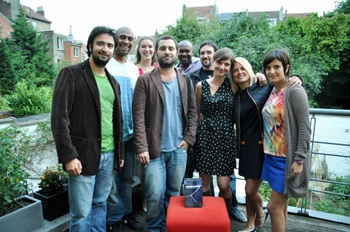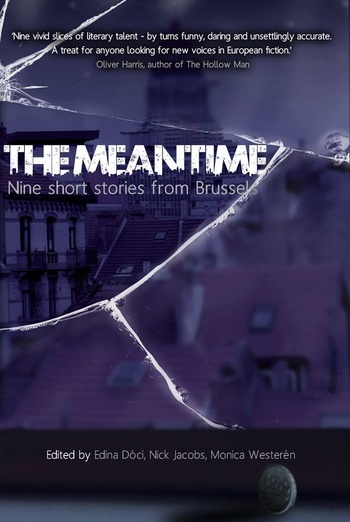The Meantime

It is doubtful whether the publication of The Meantime, a collection of nine short stories by as many authors who have settled in Brussels, can be classified with the trendy label of “city marketing”. In commercial circles, Brussels’s multiple identities would probably be considered too capricious, especially in the way they are showcased in this collection. From a creative perspective, on the other hand, it is a definite asset.

BOOK | The Meantime ●●
E. Dóci, N. Jacobs & M. Westerén (ed.) Brussels creative writers, 168 p., €9,90 (on sale at Waterstones Brussels and Amazon), www.themeantime.be
The nine authors all have in common that they live or have lived in Brussels, but are otherwise just as diverse as the city itself, with Spanish, Italian, Hungarian, Finnish, British-American, and Rwandan roots. The thing that binds all these identities, or at least their characters in The Meantime, is the search for happiness, whether it is to be found in a new job, a loved one, drugs, the city, or languages. If there is one leitmotif that runs through the whole book, it is the attempt to escape the meantime itself; to end the temporariness of that “in-between” where everything – too much? – is possible, and the toss of a coin seems to be the only way to break out.
In their attempts to find the antidote to the stress of choice, many of the characters are en route. The clearest and finest example is to be found in “The Lovely Streets” by Olivier Gbezera, an atmospheric and compelling walk down shimmering Brussels streets, revealing the city as a mental brother in arms. In “From Brussels South to Ottignies”, Monica Westerén presents a train conductor who needs an encounter with a mysterious scrounger – a hallucination? – to break out of her routine and follow her heart. For Dany G. Zuwen, public transport is a means to start a relationship. By the end of his gripping “Eight Days”, his protagonist has become aware of the vicious circle he finds himself in: every new start inevitably leads to the end. All the characters wrestle with their identity, life, and occasionally the city. Brussels is sometimes explicitly present, while at other times it only plays a bit-part. Human relations are more prominent. They are doomed, painful, slumbering, or unexpectedly heading for an impassioned end.
The nine authors are not a homogeneous set. Next to Olivier Gbezera and Monica Westerén, we would like to see more of Edina Dóci, whose fascinating “Bear Dance” sates our hunger for meticulously composed, layered stories enriched with a surprising crossing of the borders between fiction and reality; or of Nick Jacobs, whose form is the richest, but whose content also surprises. In contrast, it is a total mystery what the swiftly reeled off story by Enrique Medarde about an underground king – with a sceptre! – is doing in this particular collection.
Yes, it’s true that the language can sometimes be a bit too austere, or the stories can balance on a loose narrative tightrope, but if this is the meantime, we are very curious to see what these young people will produce when the coin has been tossed.
29/9, 20.00, FULLY BOOKED!, Passa Porta (+ drink: 22.00)
E. Dóci, N. Jacobs & M. Westerén (ed.) Brussels creative writers, 168 p., €9,90 (on sale at Waterstones Brussels and Amazon), www.themeantime.be
The nine authors all have in common that they live or have lived in Brussels, but are otherwise just as diverse as the city itself, with Spanish, Italian, Hungarian, Finnish, British-American, and Rwandan roots. The thing that binds all these identities, or at least their characters in The Meantime, is the search for happiness, whether it is to be found in a new job, a loved one, drugs, the city, or languages. If there is one leitmotif that runs through the whole book, it is the attempt to escape the meantime itself; to end the temporariness of that “in-between” where everything – too much? – is possible, and the toss of a coin seems to be the only way to break out.
In their attempts to find the antidote to the stress of choice, many of the characters are en route. The clearest and finest example is to be found in “The Lovely Streets” by Olivier Gbezera, an atmospheric and compelling walk down shimmering Brussels streets, revealing the city as a mental brother in arms. In “From Brussels South to Ottignies”, Monica Westerén presents a train conductor who needs an encounter with a mysterious scrounger – a hallucination? – to break out of her routine and follow her heart. For Dany G. Zuwen, public transport is a means to start a relationship. By the end of his gripping “Eight Days”, his protagonist has become aware of the vicious circle he finds himself in: every new start inevitably leads to the end. All the characters wrestle with their identity, life, and occasionally the city. Brussels is sometimes explicitly present, while at other times it only plays a bit-part. Human relations are more prominent. They are doomed, painful, slumbering, or unexpectedly heading for an impassioned end.
The nine authors are not a homogeneous set. Next to Olivier Gbezera and Monica Westerén, we would like to see more of Edina Dóci, whose fascinating “Bear Dance” sates our hunger for meticulously composed, layered stories enriched with a surprising crossing of the borders between fiction and reality; or of Nick Jacobs, whose form is the richest, but whose content also surprises. In contrast, it is a total mystery what the swiftly reeled off story by Enrique Medarde about an underground king – with a sceptre! – is doing in this particular collection.
Yes, it’s true that the language can sometimes be a bit too austere, or the stories can balance on a loose narrative tightrope, but if this is the meantime, we are very curious to see what these young people will produce when the coin has been tossed.
29/9, 20.00, FULLY BOOKED!, Passa Porta (+ drink: 22.00)
Read more about: Expo
Fijn dat je wil reageren. Wie reageert, gaat akkoord met onze huisregels. Hoe reageren via Disqus? Een woordje uitleg.